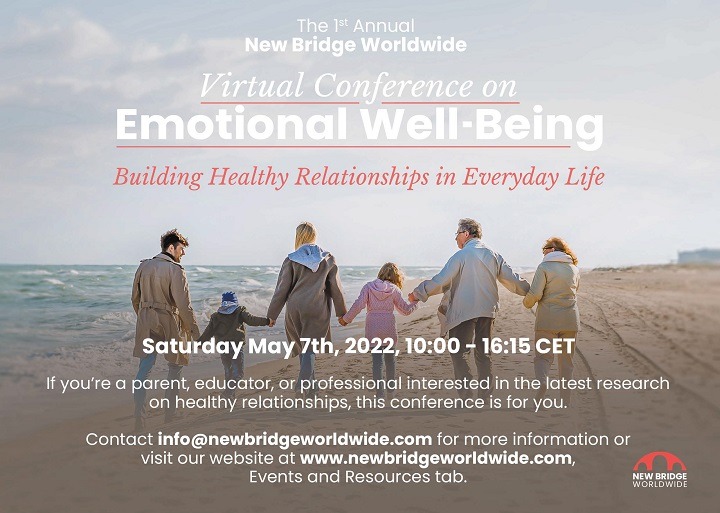TEXT: URŠKA ŽUGELJ
COVER PHOTO: UNSPLASH.COM
What is a recipe for a good life? Robert Waldinger from Harvard University puts it like this: “…over and over again, people who fared the best were the people who leaned into relationships with family, with friends, and with the community.”
Waldinger has good reasons to claim this. He is a director of the famous Harvard study that began in 1938 and is still running, thus being the longest study of determinants of healthy human aging ever conducted. Only a few of the original participants are still alive and are now in their 90’s. They were Harvard students at the onset of the study. Over the decades the study included their children and grandchildren and added a control group of participants from lower socioeconomic backgrounds.
So how is it that relationships are so beneficial to our well-being? The possible answer comes from the new science of attachment, which is drawing knowledge from developmental science, relational neuroscience, evolutionary psychology, and other relevant fields of research. It turns out that the need for connection with fellow humans is not just a fleeting feeling. The research shows it is actually a basic human need no different to the needs for food, sleep, or sex. We are internally motivated to seek closeness and connection with others and to monitor for signs that would endanger this bond.
 You might be familiar with the fight/flight/fawn/freeze stress responses. These deeply rooted responses were designed to keep us safe throughout our evolution as a species. When faced with danger we would run away (flight), attack (fight), please to appease (fawn), or in case of extreme danger, play dead (freeze). All these responses are extremely energy consuming and run at the expense of other vital processes: immune system, digestion, cognition… They were designed for extreme but short-lived life-threatening situations. After we have defended ourselves or run away, we can restore our vital functions, and that is exactly what a deer will do after escaping a lion.
You might be familiar with the fight/flight/fawn/freeze stress responses. These deeply rooted responses were designed to keep us safe throughout our evolution as a species. When faced with danger we would run away (flight), attack (fight), please to appease (fawn), or in case of extreme danger, play dead (freeze). All these responses are extremely energy consuming and run at the expense of other vital processes: immune system, digestion, cognition… They were designed for extreme but short-lived life-threatening situations. After we have defended ourselves or run away, we can restore our vital functions, and that is exactly what a deer will do after escaping a lion.
However, things get complicated with humans. We tend to overthink dangerous situations, relive them, or even just imagine them. We are also able to anticipate them. To our autonomic system, which is in charge of stress responses, this is no different from an actual lion. Theoretically this means we can keep ourselves in stress lifelong. Can you imagine what that does to our immune system or digestion?
You might be wondering what this has to do with relationships. Let me explain. A human newborn comes into this world completely dependent on the care and nurturance of designated caregivers and will remain so for another few years. Therefore, the evolutionary forces “came to believe” that being separated from our caregivers is a threat to survival. So the infant is equipped to form an attachment to whomever is carrying a hope of nurturance. Moreover, throughout evolution individuals who were part of a community had a much better chance of survival than the ones living in isolation. So, this need of an infant extends even into adulthood and we keep forming attachments throughout our lives.
Unfortunately, good relationships don’t come easy. According to a global survey from 2021, about 33 percent of adults worldwide experience feelings of loneliness on a regular basis. In addition, we might be unhappy in our closest relationships. Relationships are prone to conflicts and sometimes they end against our will: the other person doesn’t love us anymore, we move away, or someone dies. Any kind of a rupture or farewell will cause distress and psychological pain. Do we really want to go through all this?
Now, many of us are tricked into a belief that it is safer (even better) to be self-reliant, to not need others, or not to connect deeply. We even pride ourselves in doing so and look up to people who promote this attitude. However, it turns out that we cannot live without attachments, so not knowingly we might have replaced human bonds with attachment to our career, the perfect shape of our body, impeccable style, food, books, hobbies etc… But all these are only fixes for a deep longing that is not satisfied and thus provoking our autonomous nervous system (the one that is not under conscious control) to keep triggering stress responses. Not being able to connect meaningfully with others for longer periods of time becomes chronic stress.
When we get stuck in our stress responses our capacity for engagement with others, our empathy, compassion, perspective taking and even our self-regulation gets eclipsed, and a vicious cycle begins. From this place it gets even harder to form meaningful connections with others.
Getting the relationships right seems to be a challenge for many. Waldinger is quite straightforward about it: “So why is it so easy to ignore this fact that relationships are important? Well,” he says, “we live in a time where we seek quick fixes, something that we can get and will make our lives good and keep them that way. Relationships are messy and they are complicated, the hard work of tending to family and friends, it’s not sexy or glamorous. It is also life long, it never ends.”
Let me reassure you, relationships don’t need to be perfect to play a protective role in our health and well-being. We now know that conflicts and ruptures in relationships are inevitable, so the goal is to stay respectful during conflict, make the repair, and find ways to express caring and appreciation.

The benefits of investing in our relationship accounts are not to be ignored anymore. However, you might have struggles that go beyond what is the scope of this article, so I invite you to stay curious and explore. At New Bridge Worldwide we are setting up an online conference where we, along with our trusted experts in the field, share latest research, insights, and strategies to tackle various relationship issues.
Note from the author: Building healthy relationships might not come easily to us, so the first step is to become curious and to intentionally seek for ways to build connections. However, the challenges are numerous. The team at New Bridge Worldwide has gathered a line-up of experts for an online conference to dive deeper into building relationships that matter in different arenas of life, taking place on May 7th. We invite you to check out our program on our website or you can register today at this link.
Disclaimer: This article is not referring to people in violent or abusive relationships.


